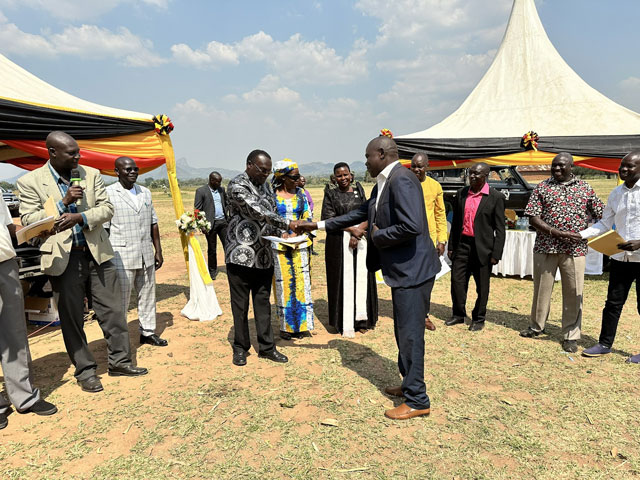
Agago , Uganda | THE INDEPENDENT | The Ministry of Lands Housing and Urban Development has issued 1,017 Customary Certificates of Ownership, to families in Agago district.
The titles were given to individuals, families, and two clans; Karuge Katugu and Lwara Kare in Wol and Paimol Subcounties.
The issuance followed a pilot project launched by the government in 2020 under the DINU Land component with financial support from the EU and the United National Capital Development Fund, UNCDF. It is aimed at documenting customary land, and issuing a government document as provided for by the Constitution and the Land Act.
While issuing the certificates on Thursday at Kalongo Grounds in Kalongo Town Council, the Minister of Lands, Housing and Urban Development Judith Nabakooba, said customary land registration is in fulfillment of the NRM’s current manifesto to process and give land owners legal documentation in terms of customary land titles.
According to Nabakooba, the processing of customary land certificates could help to resolve the many land conflicts that take years and years to resolve with a lot of negative impact on productivity and land use.
She argued that the implementation of the land registration is aimed at ensuring customary land owners including individuals, families, and clans have their land identified, demarcated, and registered and in turn receive legal documentation as proof of land ownership.
“Because of this exercise, peace, and productivity have returned. Families and communities have begun to engage in producing surplus food for sale, knowing that no one will destroy their crops through acts of illegal land evictions,” Nabakooba said.
Nabakooba revealed that although the pilot project ended, the government would continue to register more clans to acquire customary land certificates with support from the European Union and the World Bank, with the Ministry, targeting the registration of 275,000 customary land owners including families, clans, and indigenous communities throughout the county before 2026.
She argued that registration of customary land is the best way to secure customary ownership rights and thereby prevent public outcry, including stopping the abuse, stealing, or grabbing of customary land by unscrupulous individuals, speculators, and fraudulent land dealers.
Charles Banya, a resident of Wol sub-county who benefited from the pilot project, said the certificate is a sure way of safeguarding land for posterity and motivating them to keep land the same way their forefathers did.
Banya said besides limiting land wrangles, land certificates are important in securing land, which is a vital asset needed for development.
Ultimo Oyet, another beneficiary of the customary land registration from Wol Sub-county, whose land is near a community school.
Oyet believes that having a certificate for their land will prevent future land grabbing which always affects land owners near public institutions.
Denis Obbo, the Commissioner at the Ministry of Lands, Housing and Urban Development, advised the holders of the land titles against using them as collateral to get loans that they will fail to pay.
****
URN
 The Independent Uganda: You get the Truth we Pay the Price
The Independent Uganda: You get the Truth we Pay the Price





